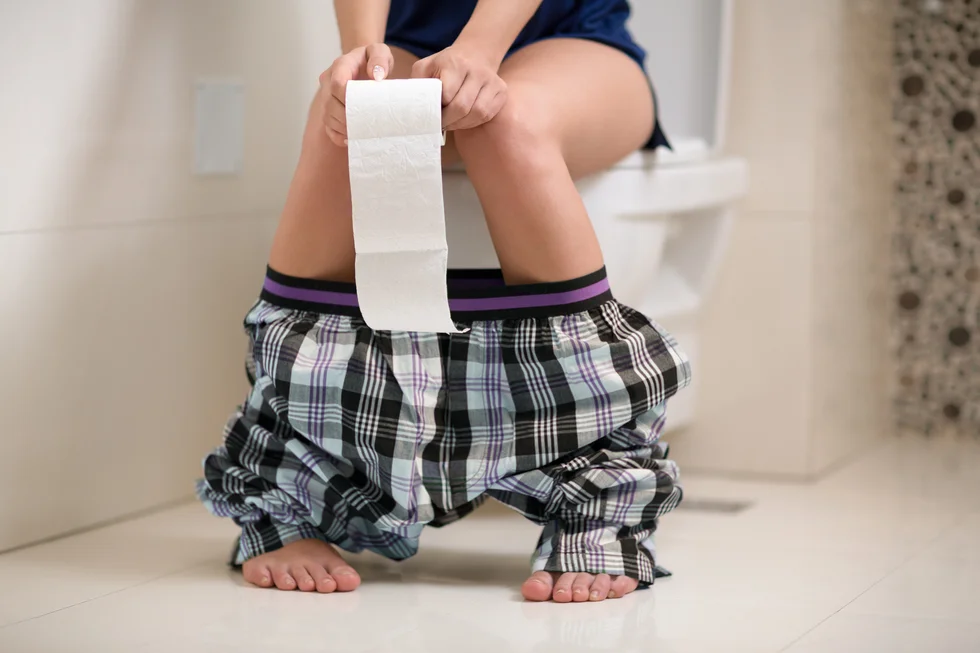From Women's Health Foundation
Having a hard time going to the bathroom? If you're going less than three times a week, you may be suffering from constipation. But take heart—you're not alone. More than 4 million Americans suffer from frequent constipation, and women are three times more likely to have stubborn bowels than men.
Constipation, or the formation of dry, hard stool in the rectum, is not only embarrassing, uncomfortable and painful, it can interfere with proper urinary function. If the rectum is filled with stool, pressure can move the bladder, affecting the ability to close tightly (and prevent urine leakage).
It's very important to stay regular, as frequent or chronic straining (or bearing down) for a bowel movement can weaken the pelvic floor muscles, similar to pushing down on a hammock and stretching it.
When you feel the need to go, make the effort to go. If chronically suppressed, the urge to have a bowel movement becomes less noticeable and more easily ignored.
Influences and Causes
Most commonly, constipation is symptomatic of poor diet and lifestyle behaviors. Medications, lack of exercise, a diet low in fiber and fluids, travel, a change in routine and illness can all be factors. Constipation can also result from several medications and the hormonal changes you experience during pregnancy or in the week before your period.
To understand constipation, it helps to know how the colon, or large intestine, works. As food moves through the colon, the colon absorbs water from the food while it forms waste products, or stool. Muscle contractions in the colon then push the stool toward the rectum. By the time stool reaches the rectum it is solid, because most of the water has been absorbed. Constipation occurs when the colon absorbs too much water or if the colon's muscle contractions are slow or sluggish, causing the stool to move through the colon too slowly. As a result, stools can become hard and dry.
Common causes of constipation are:
- Not enough fiber in the diet
- Lack of physical activity (especially in the elderly)
- Medications
- Milk
- Irritable bowel syndrome
- Changes in life or routine such as pregnancy, aging and travel
- Abuse of laxatives
- Ignoring the urge to have a bowel movement
- Dehydration
- Specific diseases or conditions, such as stroke (most common)
- Problems with the colon and rectum
- Problems with intestinal function (chronic idiopathic constipation)
Not enough fiber in the diet. People who eat a high-fiber diet are less likely to become constipated. The most common causes of constipation are a diet low in fiber or a diet high in fats, such as cheese, eggs, and meats. Fiber—both soluble and insoluble—is the part of fruits, vegetables and grains that the body cannot digest. Soluble fiber dissolves easily in water and takes on a soft, gel-like texture in the intestines. Insoluble fiber passes through the intestines almost unchanged. The bulk and soft texture of fiber help prevent hard, dry stools that are difficult to pass. Find out How to Eat More Whole Grains.
Lack of physical activity. A lack of physical activity can lead to constipation, although health care professional do not know precisely why. For example, constipation often occurs after an accident or during an illness when one must stay in bed and cannot exercise. Lack of physical activity is thought to be one of the reasons constipation is common in older people.
Medications. Some medications can cause constipation, including:
- Pain medications (especially narcotics)
- Antacids that contain aluminum and calcium
- Blood pressure medications (calcium channel blockers)
- Anti-Parkinson drugs
- Antispasmodics
- Antidepressants
- Iron supplements
- Diuretics
- Anticonvulsants
Changes in life or routine. During pregnancy, women may be constipated because of hormonal changes or because the uterus compresses the intestine. Aging may also affect bowel regularity, because a slower metabolism results in less intestinal activity and muscle tone. In addition, people often become constipated when traveling, because their normal diet and daily routine are disrupted.
Abuse of laxatives. The common belief that people must have a daily bowel movement has led to self-medicating with over-the-counter laxative products. Although people may feel relief when they use laxatives, typically they must increase the dose over time because the body grows reliant on laxatives to have a bowel movement. As a result, laxatives may become habit-forming.
Ignoring the urge to have a bowel movement. People who ignore the urge to have a bowel movement may eventually stop feeling the need to have one, which can lead to constipation. Some people delay having a bowel movement because they do not want to use toilets outside the home. Others ignore the urge because of emotional stress or because they are too busy. Children may postpone having a bowel movement because of stressful toilet training or because they do not want to interrupt their play.
Dehydration. Research shows that although increased fluid intake does not necessarily help relieve constipation, many people report some relief from their constipation if they drink fluids such as water and juice and avoid dehydration. Liquids add fluid to the colon and bulk to stools, making bowel movements softer and easier to pass. People who have problems with constipation should try to drink liquids every day. However, liquids that contain caffeine, such as coffee and cola drinks will worsen one's symptoms by causing dehydration. Alcohol is another beverage that causes dehydration. It is important to drink fluids that hydrate the body, especially when consuming caffeine-containing drinks or alcoholic beverages.
Specific diseases. Diseases that cause constipation include neurological disorders, metabolic and endocrine disorders and systemic conditions that affect organ systems. These disorders can slow the movement of stool through the colon, rectum or anus. Conditions that can cause constipation include:
- Neurological disorders
- Multiple sclerosis
- Parkinson's disease
- Chronic idiopathic intestinal pseudo-obstruction
- Stroke
- Spinal cord injuries
- Metabolic and endocrine conditions
- Diabetes
- Uremia
- Hypercalcemia
- Poor glycemic control
- Hypothyroidism
- Systemic disorders
- Amyloidosis
- Lupus
- Scleroderma
Treatments and Remedies
To get regular and stay regular, try these approaches:
- Drink plenty of fluids and stay hydrated. To check your hydration levels, take a look at the color of your urine. If you are fully hydrated, your urine will be pale yellow or even colorless.
- Eat fiber, fiber and more fiber. Fiber is important for regular bowel function, so make sure that you eat plenty of whole grains, fruits and vegetables. It's a good idea to increase your fiber intake gradually and remember to drink plenty of water after eating high-fiber foods. (After all, you don't want to trade constipation for gas.)
- An apple a day keeps the doctor away—and keeps things moving in your colon. Apples are a great source of fiber, and they help support normal bowel function.
- Try to establish a routine for bowel elimination. In other words, try to go at the same time every day. You wouldn't leave the house in the morning without brushing your teeth, so make a toilet date, and take the same care with your colon. If you don't need to go, though, don't force it.
- Respond to the urge for a bowel movement. When you do need to go, go.
- Except in rare cases, avoid chemical-based laxatives such as Ex-Lax or Correctol. Excessive laxative use is likely to make your bowel "lazy" and dependent on the laxatives to work. You may also end up in a vicious cycle, alternating between constipation and diarrhea.
- Don't skip meals. Eating stimulates the reflex that causes food (and waste) to move through your digestive system.
- Sit, don't strain, when you are trying to go to the bathroom. Not only can forcing out hard, dry stool lead to hemorrhoids and a protrusion of rectal tissue, but it can also put you at risk for developing uterine prolapse.
- Try propping your feet up on a stool with your knees bent while you sit on the toilet. This should straighten the angle of your bowel and help you pass stool more quickly without straining.
Regularity recipe. The following is a recipe for a high-fiber jam that can be made at home and kept in the refrigerator. Eating it with toast or crackers (preferably whole-grain) daily can help provide fiber to your diet and reduce constipation. It also may be helpful for symptoms of irritable bowel syndrome.
High Fiber Jam
1 cup applesauce
1 cup bran
½ cup prune juice
This mixture should have a jam-like consistency. Keep it in a covered container in the refrigerator.
Eat one tablespoon of the mixture every evening; it may help to stimulate a morning bowel movement. If you do not notice an improvement within a couple of days, increase your portion to two tablespoons every evening. For most people this is enough. However, if you are not experiencing regular bowel movements, you may add up to two tablespoons in the morning as well, up to a maximum of four per day. Always drink one large glass of water (at least 8 ounces) with the jam to prevent gas.
Learn more about How to Deal With Constipation.
If your constipation becomes chronic or persistent, consult with your health care professional. If simple measures like adding more fiber don't help, your health care professional might recommend additional treatment based on your own personal lifestyle and dietary factors. Additional treatments include:
Behavioral treatment. Bowel training and biofeedback are effective treatments that your health care professional may recommend.
- Bowel training involves sitting on the toilet for 15 to 20 minutes at the same time each day. You're teaching your body to get in the habit of having regular bowel movements.
- Biofeedback is sometimes used to help constipation, as well as other pelvic floor disorders. In this procedure, special sensors measure bodily functions and help you understand how certain approaches to having a bowel movement may be more effective.
Surgical treatment. Surgery is a final option for chronic constipation. It should be considered only after careful assessment by a gastroenterologist and colorectal surgeon—after all other treatments have not worked.







